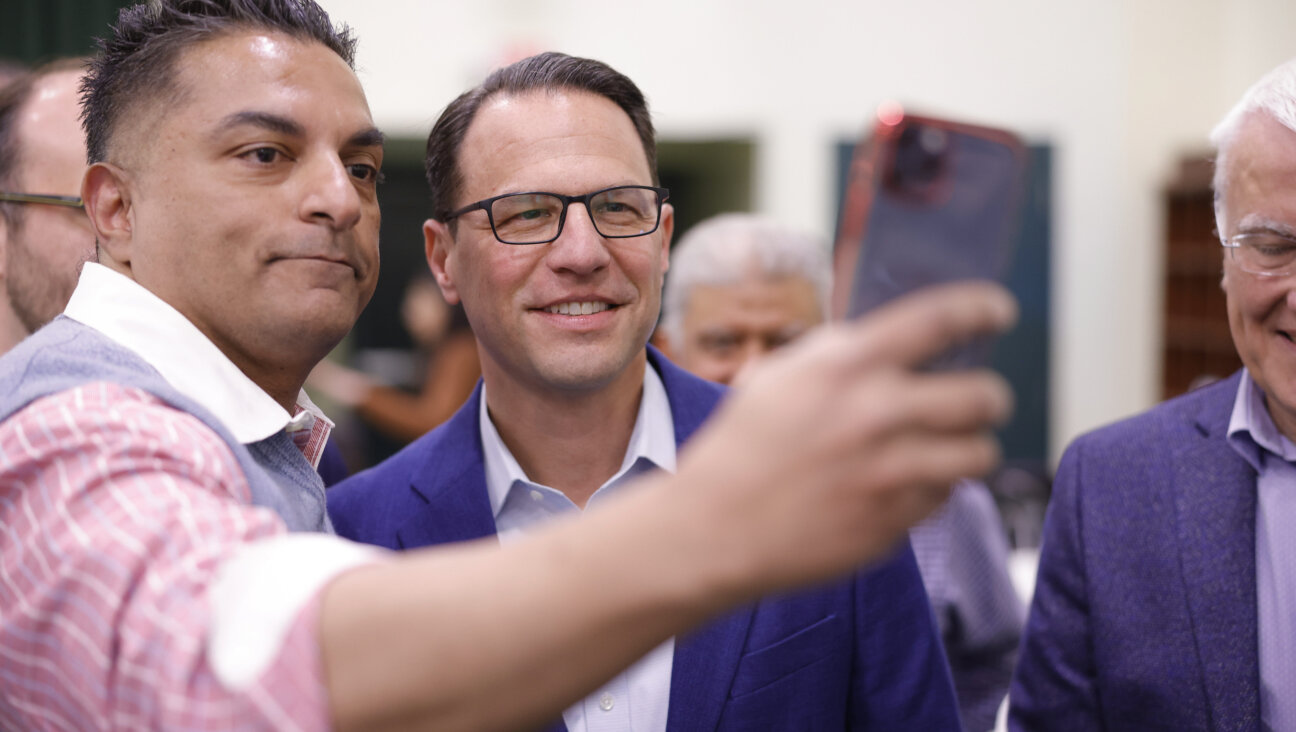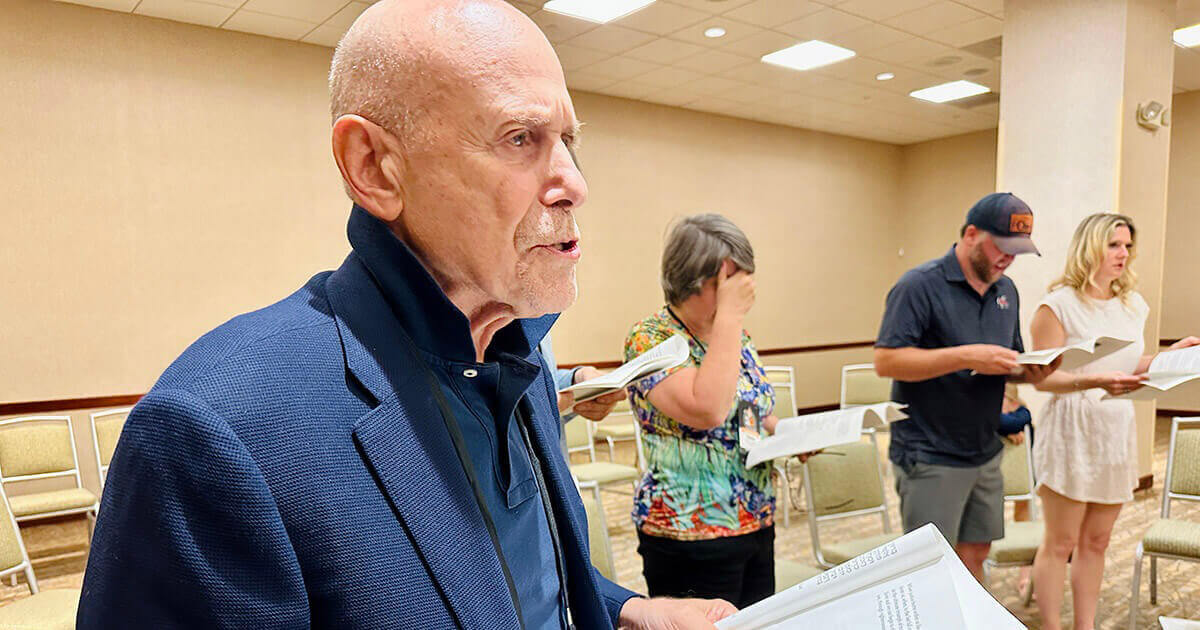Helping Homeless, One Night at a Time
Everyone seems to have a friend or neighbor affected by the economic downturn here in Seattle, where fallout from the dot-com crash and massive Boeing layoffs have yet to settle and the ranks of hungry and homeless have grown. The congregants of one Reform synagogue — known for its activist bent — in Seattle’s North End decided they could not turn a blind eye to local suffering. And so they invited roughly 100 homeless adults to pitch their tents in the synagogue parking lot.
It all began when Rabbi Beth Singer of Temple Beth Am suggested that her synagogue play host to the roving “Tent City,” the community of homeless who since 2000 have set up camp in the parking lots of churches and nonprofits for anywhere between a few weeks and three months. Never before had a synagogue offered to share their lot with Tent City.
Although the synagogue “encourages its membership to join as activists in the effort to bring Tikkun Olam — healing and social justice — to the world,” according to its Web site, the rabbi said she was surprised at how readily the temple leadership agreed to her proposal.
“I was initially concerned that our synagogue leadership and the private high school that shares space with us would object,” Singer said. But she “was delighted that they signed on with such ease…. Not only have all the facets of our synagogue been supportive, but the University Prep High School with whom we share space outdid themselves to join with us as gracious hosts.”
On June 22, Tent City set up camp outside the synagogue, where its denizens stayed until this past Sunday. In that time, the congregants interacted with their temporary guests, including Tuesday night potlucks hosted by the synagogue. They discovered how these fellow Washingtonians had ended up living in church and synagogue parking lots. They heard the stories of people who have full-time jobs but can’t afford to pay rent or can’t pass the credit checks that landlords require.
Sandy Voit, executive director of the synagogue, was not at all surprised at the enthusiastic reception. He said that the economic downturn has opened up some hearts to those living on the edge and that through interacting with the Tent City guests, the congregants developed a better understanding of their plight.
“There are a lot of families out here who are four or five paychecks away from the same situation,” Voit said, adding that Jewish Family Service has referred a number of families to the temple office for financial assistance. “There’s a significant percentage of temple members who are not paying anything in dues.”
“The economy did partly drive our concern,” said Al Sion, a member of the synagogue’s social action committee. “The state of Washington is in a severe budget crunch; therefore we’re not doing enough for people who need it.”
Temple Beth Am is by no means the first Seattle-area congregation to address economic justice issues, only the most recent. For years, Seattle’s largest Reform congregation, Temple De Hirsch Sinai, has put mats on its floor for overflow from the Catholic Community Services women’s shelter. Many congregations work together on food drives and fundraising efforts for the Jewish Family Service food bank and the Seattle Jewish Coalition for the Homeless.
But there seems to be renewed enthusiasm for these efforts. Gaby Bell, a longtime member of Temple Beth Am’s social action committee, hopes this fall’s food drive will break a record. The goal is to collect more than 800 bags of groceries for the JFS food bank — one for each synagogue household. She says more than 100 individuals turned out to help during Tent City’s six-week stay. Others just dropped by to spend time with the “residents” or to deliver cold drinks and snacks.
Bell said she was glad to see some new faces among the volunteers and was impressed by their numbers — despite summer vacations. The former caterer has been involved in projects feeding the homeless for more than a dozen years. “Our temple is trying…. to help in whatever way they can,” she said. Hunger is “a tough issue,” she added.
Now that Tent City has moved on, Temple Beth Am’s social action committee is looking into a new project to help the homeless. Sion says they have taken the first steps toward exploring the idea of providing temporary housing for people in transition or subsidizing and supporting people through credit guarantees as they move into apartments. Both ideas would involve far more money, legal hassles and support services than Tent City’s stay. Even so, Sion believes synagogue members are ready to move up to the next level of social action.
“Five years ago, I don’t think we were ready to do more than make a contribution here or there,” he said, adding that the members have been inspired by both their rabbis, Rabbi Beth Singer and her husband, Senior Rabbi Jonathan Singer. According to Sion, Singer has been talking about trying to raise money to buy a house or small apartment building to house the homeless, even as the congregation talks about raising money for a synagogue addition.
“We are not a social island. We live in the community. Living in the community means you have a responsibility to each other,” Sion said. “Seattle is, of course, suffering more than most other regions of the country economically. This concerns all of us.”
Sally Kinney, another member of the social action committee, said the experience of hosting Tent City “has given the temple membership, generally, a lot more motivation to try to do what we can to see that this doesn’t have to go on forever. We would like Tent City to not have to exist. But it is necessary now.”
Rabbi Beth Singer expressed respect for the Tent City community’s desire and commitment to getting themselves off the streets. After an initial meeting with members of the group, she decided that it would be beneficial for her congregants to get to know the Tent City people.
“One sweet memory I possess of our first meeting is of the Tent City community member who gingerly asked, ‘How do Jews feel about coffee because we put up a pot of coffee each morning?’ We assured them that Jews are favorable toward coffee!” Singer wrote in an e-mail from her sabbatical. “I realized that, in addition to performing the basic mitzvah of providing shelter for the homeless, we could also build a stronger bridge of understanding.”
Temple leaders added that they hope Tent City will return someday.
Donna Gordon Blankinship is a freelance writer living in Seattle.
A message from our editor-in-chief Jodi Rudoren

We're building on 127 years of independent journalism to help you develop deeper connections to what it means to be Jewish today.
With so much at stake for the Jewish people right now — war, rising antisemitism, a high-stakes U.S. presidential election — American Jews depend on the Forward's perspective, integrity and courage.
— Jodi Rudoren, Editor-in-Chief






















